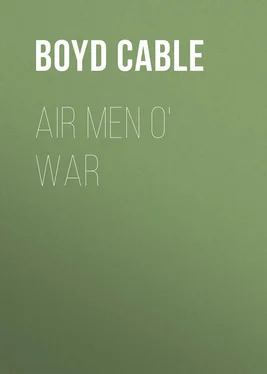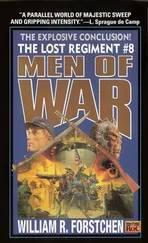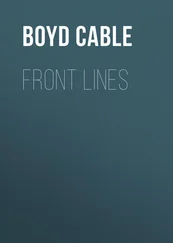Boyd Cable - Air Men o' War
Здесь есть возможность читать онлайн «Boyd Cable - Air Men o' War» — ознакомительный отрывок электронной книги совершенно бесплатно, а после прочтения отрывка купить полную версию. В некоторых случаях можно слушать аудио, скачать через торрент в формате fb2 и присутствует краткое содержание. Издательство: Иностранный паблик, Жанр: foreign_antique, foreign_prose, на английском языке. Описание произведения, (предисловие) а так же отзывы посетителей доступны на портале библиотеки ЛибКат.
- Название:Air Men o' War
- Автор:
- Издательство:Иностранный паблик
- Жанр:
- Год:неизвестен
- ISBN:нет данных
- Рейтинг книги:3 / 5. Голосов: 1
-
Избранное:Добавить в избранное
- Отзывы:
-
Ваша оценка:
- 60
- 1
- 2
- 3
- 4
- 5
Air Men o' War: краткое содержание, описание и аннотация
Предлагаем к чтению аннотацию, описание, краткое содержание или предисловие (зависит от того, что написал сам автор книги «Air Men o' War»). Если вы не нашли необходимую информацию о книге — напишите в комментариях, мы постараемся отыскать её.
Air Men o' War — читать онлайн ознакомительный отрывок
Ниже представлен текст книги, разбитый по страницам. Система сохранения места последней прочитанной страницы, позволяет с удобством читать онлайн бесплатно книгу «Air Men o' War», без необходимости каждый раз заново искать на чём Вы остановились. Поставьте закладку, и сможете в любой момент перейти на страницу, на которой закончили чтение.
Интервал:
Закладка:
Boyd Cable
Air Men o' War
FOREWORD
It has been my endeavour throughout these tales not only to chronicle some of the wonderful work done in the air, but also to show the connection between it and that of the Armies on the ground, the assistance rendered in so many ways by the air arm, and its value in a battle and in a campaign. I hope that my stories may show something of the skill and daring of the air men and – what is less well known to the public – how much they are doing to save the lives and cut down the casualties of the men on the ground, and to help our arms to victory.
Already I have been rebuked for exaggerating and making my characters perform impossible feats, so I may forewarn the reader that I have written nothing here for which I cannot find an actual parallel – and in some cases even more wonderful – fact. Practically every incident I have pieced into my tales has, to my own knowledge, occurred, and I have left untold many which for sheer sensationalism would beat these hollow. There are many in the Air Force who will recognise incidents and feats, but will not recognise the characters I have attached to them, because – mainly at the urgent wish of the men themselves – I have used entirely fictitious characters and names throughout. Because most of the writing was done while the R.N.A.S. and R.F.C. were still in existence I have left this as written.
I ask the indulgence of critical readers amongst the air men to any technical errors they may discover (knowing how keenly they will look for them). I make no pretence to being a flying man myself, but because I have done flying enough – or rather have been flown, since I am not a pilot – to know and appreciate some of the dangers and risks and sensations of the work, and have lived for over a year in the Squadrons at the Front, I cherish the hope that I have absorbed enough of the nature and atmosphere of the work to present a true picture of the life. I shall be very well content if I have been able to do this, and, in any slightest degree, make plain how vital to success a strong Air Force is. I have had experience enough of the line, and have gained enough knowledge of the air, to be tremendously impressed with the belief, which I have tried in this book to pass on and spread, that every squadron added, every man trained, every single machine put in the air, helps in its own measure to bring us to final victory, more quickly, and at a less cost in the long and heavy "butcher's bill" of the war.
I
SILVER WINGS
An old man working in one of the aircraft factories once complained that he was not very satisfied with his job. "I've got three boys out Front, all in the infantry; and I keep thinkin' to myself, Why shouldn't I be doin' some sort of munition work that 'ud help my own three boys? I don't know a livin' soul in the Flyin' Corpse; why should I be workin' for them, an' not makin' shells or bombs or suthin' that 'ud be helpin' my own three boys?"
And then somebody told him how he was helping his boys, what the work of the air services really meant, how the artillery observation, and photographing, and bombing, and directing the guns on to hostile batteries and machine-gun emplacements, and so on, all worked up to the one great end, to making the task easier for the infantry, to saving the lives of the men on the ground; and told a few stories of some of the ninety and nine ways this help works out.
The old man was fully satisfied and grateful for all that was told him, and declared he'd go back to his job with twice the heart – "just knowin' I'm doin' mebbe the best work I could, and that I'm givin' real help to my own three boys."
Amongst the tales told him the one of "Silver Wings" perhaps impressed him most, and that, probably because it bore more plainly its own meaning of help to the infantry, was more easy to make clear than the technicalities of artillery observation and the rest.
And just because it is such a good instance of how, after all, the chief or only end and aim of the air services is the helping to victory of the men on the ground this story of "Silver Wings" may be worth the telling here.
Hard fighting had been in progress for some days, and the flying men had been kept desperately busy from dawn to dark on the various branches of their several works, when a "dud day" – a day of rain and squalls and hurricane winds – gave them a chance to rest.
Toward afternoon the weather showed signs of abating a little, and word came through to the Squadron to which "Silver Wings" belonged asking if they could get a machine in the air and make a short patrol over the line on a special reconnaissance. A heavy and unpleasantly gusty wind was still blowing, but a pilot and machine were picked for the job and presently made the attempt. An anxious Squadron Commander and a good many of the pilots watched the trial and saw the quick result. The machine was brought out with mechanics hanging to the wing-tips to steady her against the gusts, the engine started and given a trial run up; then the pilot eased her off, looked round, felt his controls, ran the engine up again until his machine was throbbing and quivering to the pull of the whirling propeller, and waved the signal to haul away the chocks that blocked his wheels. His machine began at once to taxi up into the wind, still swaying and swinging dangerously, and then, in answer to the pilot's touch, lifted clear of the ground, ducked a second, rose again and swooped upward. The watching crowd let go a breath of relief as she rose clear, but before the breath was out it changed to a gasp of horror as the machine, caught by some current or eddy of wind, swerved, heeled, righted under the desperate effort of the pilot, slipped sideways, and with a sudden swoop plunged and crashed on the ground. The machine was hopelessly smashed and the pilot was dead when they ran and came to him and picked him up.
The Squadron Commander would have abandoned or postponed the attempt to get a machine up, but the pilot of "Silver Wings" spoke to him and urged that he be allowed to have a try. "I'm sure I can get her off," he said. "I'll take her right over to the far side of the ground clear of the currents round the sheds. I know what she can do, and I'm certain I can make it."
So the Major gave a reluctant consent, and they all watched breathlessly again while "Silver Wings" fought her way along the ground against the wind, lifted suddenly, drove level for a hundred feet, swooped sickeningly again until her wheels were a bare six feet off the ground, hoicked up and away. Everyone could see by her dips and dives and sudden heelings and quick righting how bumpy and gusty the air was, and it was not until she was up several hundred feet, and came curving round with the wet light shining on her silvery planes that the watchers on the ground heaved a sigh of relief, watched her streak off down wind, and swing in a climbing turn that lifted her farther and farther into the safety of height.
"He's all right now," said one. "Only, the Lord help him when he comes to land again." The hum of the engine droned down to them, and the shining wings wheeled again close up against the dark background of the low clouds and shot swiftly down wind towards the lines.
Over the lines she turned again and began to fight her way across wind and moving slowly north. The wind constantly forced her drifting over Hunland, and in accordance with his orders to hold close along the front, the pilot had to keep making turns that brought him facing back to the west and fighting slowly up wind, edging off a little and slanting north and watching the landscape slide off sideways under him. And so, tacking and manœuvring buffeted and wind-blown, he edged his way along the front, his eyes alternately on the instrument-board and on the ground and puffing shell smoke beneath, his ears filled with the roar of his engine and the shriek and boom of the wind beating about him, his hands and feet in constant motion, juggling with controls, feeling, balancing, handling the throbbing horse-power and the wind-tossed fabric under him.
Читать дальшеИнтервал:
Закладка:
Похожие книги на «Air Men o' War»
Представляем Вашему вниманию похожие книги на «Air Men o' War» списком для выбора. Мы отобрали схожую по названию и смыслу литературу в надежде предоставить читателям больше вариантов отыскать новые, интересные, ещё непрочитанные произведения.
Обсуждение, отзывы о книге «Air Men o' War» и просто собственные мнения читателей. Оставьте ваши комментарии, напишите, что Вы думаете о произведении, его смысле или главных героях. Укажите что конкретно понравилось, а что нет, и почему Вы так считаете.












